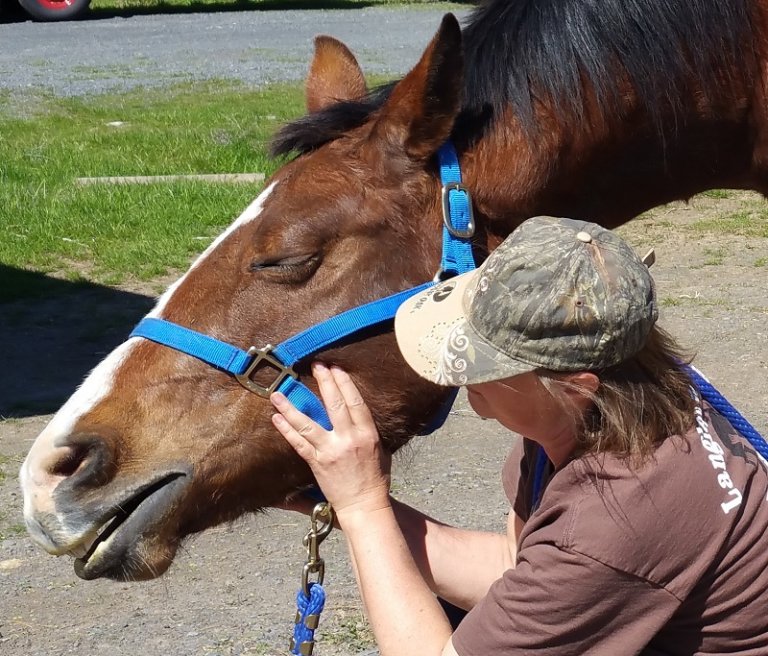RULE OUT THE OBVIOUS WHEN YOUR HORSE HAS PROBLEMS
By Mary Lou Langley LMT

Spring is a perfect time to make sure your horse’s health is on track. As a licensed massage therapist, I have come to understand how important it is to have a yearly checkup. My horse’s springtime maintenance includes worming, shots, a course of SandClear™, dental examination, sheath cleaning and smegma “bean” removal. (Yes, I am going to talk about that dirty, awkward job of sheath cleaning.)
I ask my clients when dental work and sheath cleaning was last performed. Dental problems and dirty sheaths affect the outcome and effectiveness of my work. If your horse displays head tossing or low back pain, first consider proper saddle fit, bridle fit, hoof angles, and any dental or sheath conditions.
Here are a few of my experiences.
Skittles
Skittles suffered from lower back pain and was adopting a camped-under posture. I administered massage, micro-current stimulation and red-light therapy.
Skittles would try to urinate 3-4 times each session. His urine was milky in color and wasn’t a full stream. The lower back spasms did not improve and he started developing roach back.
Blood work was performed by a vet. Unfortunately, we overlooked cleaning his sheath and neglected to check for beans. Eventually he was checked and huge smegma plugs where extracted.
Strain and pain had caused him to compensate, causing the mild roach back. With no beans, he was able to urinate and the roach back symptoms disappeared.
Roping Horse
A man brought me his roping horse saying, “He just isn’t moving right on the hind end.” I asked him how long he had owned him, and he said 5 years.
“When was the last time you had his sheath cleaned?”
“Never.”
After examination of his sheath, it was discovered he was plugged substantially with dirt and grime. It was a wonder he could even let down.
I instructed my client on the importance of sheath cleaning and checking for smegma/bean removal as this could be a factor in hind end issues. If the sore back wasn’t being caused by poor saddle fit, hock, or stifle issues, but was internal, my massage work wouldn’t be completely effective or lasting.
My client called a few days later and said large beans (the source of pain) were removed now the horse could perform better. I am not saying this was the horse’s only issue, but it is the first thing to rule out, and it is simple and cheap.
Romeo
This horse came to me for massage. Romeo loved and responded well to my sessions yet some of his issues ended up being outside my scope of practice. A veterinarian properly diagnosed the horse with huge bladder stones which required major surgery to remove. Romeo recovered and is doing great.
My point is that sometimes your horse’s issues are serious. No amount of massage would have helped this particular condition. I caution you not to think a massage therapist is a magic wand or trust the latest gadgets that are touted as cure-alls. Sometimes you just need to call the vet. Now when I massage Romeo it’s more effective.
Let’s talk about teeth!
Dr. Kerry Ridgeway, DVM says 70 percent of horses coming into his practice have TMJ issues. Wow! As a therapist I see a majority of horses suffering with poll, jaw and head pain.
Horses with jaw pain can be helped with massage. However, if the horse has sharp points poking the soft tissue in its mouth, massage could irritate the tissue even more.
I have my horse’s teeth examined by a veterinarian yearly and there is always some new thing that has developed that needs attention. So, you may wonder why your horse is throwing its head and resisting collection. Ask yourself when you last had a qualified professional (veterinarian) float their teeth.
Opinions vary regarding the optimal frequency of dental check-ups. My personal experience has taught me no matter the age of the horse, significant changes can occur annually.
I like to have a professional baseline every spring just to know what is going on with my own horses. Benjamin Franklin said, “An ounce of prevention is worth a pound of cure.” I believe that is still true today.
If you’re interested in learning techniques to massage your own horse, consider attending one of my 2-day self-enrichment clinics. Langley Equine Studies offers clinics on-campus annually. If you are interested in attending or hosting one in your area contact me for availability.
Originally published in the May 2019 Edition of the NorthWest Horse Source

